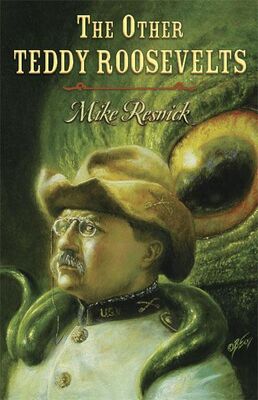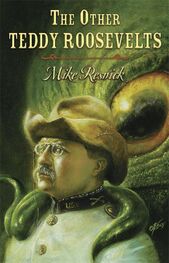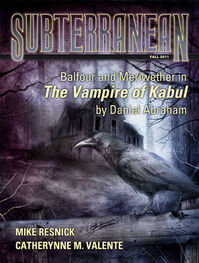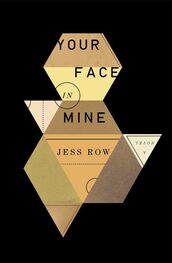* * *
Having done everything else one could do in the Bad Lands, Roosevelt became a Deputy Sheriff. And in March of 1886, he found out that it meant a little more than rounding up the town drunks on a Saturday night. It seems that a wild man named Mike Finnegan, who had a reputation for breaking laws and heads that stretched from one end of the Bad Lands to the other, had gotten drunk and shot up the town of Medora, escaping — not that anyone dared to stop him — on a small flatboat with two confederates. Anyone who’s ever been in Dakota in March knows that it’s still quite a few weeks away from the first signs of spring. Roosevelt, accompanied by Bill Sewell and Wilmot Dow, was ordered to bring Finnegan in, and took off after him on a raft a couple of days later. They negotiated the ice-filled river, and finally came to the spot where the gang had made camp. Roosevelt, the experienced hunter, managed to approach silently and unseen until the moment he stood up, rifle in hands, and announced that they were his prisoners. Not a shot had to be fired. But capturing Finnegan and his friends was the easy part. They had to be transported overland more than 100 miles to the town of Dickenson, where they would stand trial. Within a couple of days the party of three lawmen and three outlaws was out of food. Finally Roosevelt set out on foot for a ranch — any ranch — and came back a day later with a small wagon filled with enough food to keep them alive on the long trek. The wagon had a single horse, and given the weather and conditions of the crude trails, the horse couldn’t be expected pull all six men, so Sewell and Dow rode in the wagon while Roosevelt and the three captives walked behind it on an almost non-existent trail, knee-deep in snow, in below-freezing weather. And the closer they got to Dickenson, the more likely it was that Finnegan would attempt to escape, so Roosevelt didn’t sleep the last two days and nights of the forced march. But he delivered the outlaws, safe and reasonably sound. He would be a lawman again in another nine years, but his turf would be as different from the Bad Lands as night is from day. He became the Police Commissioner of New York City.
* * *
New York was already a pretty crime-ridden city, even before the turn of the 20 thCentury. Roosevelt, who had already been a successful politician, lawman, lecturer and author, was hired to change that — and change it he did. He hired the best people he could find. That included the first woman on the New York police force — and the next few dozen as well. (Before long every station had police matrons around the clock, thus assuring that any female prisoner would be booked by a member of her own sex.) Then came another innovation: when Roosevelt decided that most of the cops couldn’t hit the broad side of a barn with their sidearms, target practice was not merely encouraged but made mandatory for the first time in the force’s history. When the rise of the automobile meant that police on foot could no longer catch some escaping lawbreakers, Roosevelt created a unit of bicycle police (who, in the 1890s, had no problem keeping up with the cars of that era which were traversing streets that had not been created with automobiles in mind.) He hired Democrats as well as Republicans, men who disliked him as well as men who worshipped him. All he cared about was that they were able to get the job done. He was intolerant only of intolerance. When the famed anti-Semitic preacher from Berlin, Rector Ahlwardt, came to America, New York’s Jewish population didn’t want to allow him in the city. Roosevelt couldn’t bar him, but he came up with the perfect solution: Ahlwardt’s police bodyguards were composed entirely of very large, very unhappy Jewish cops whose presence convinced the bigot to forego his anti-Semitic harangues while he was in the city. Roosevelt announced that all promotions would be strictly on merit and not political pull, then spent the next two years proving he meant what he said. He also invited the press into his office whenever he was there, and if a visiting politician tried to whisper a question so that the reporters couldn’t hear it, Roosevelt would repeat and answer it in a loud, clear voice.
* * *
As Police Commissioner, Roosevelt felt the best way to make sure his police force was performing its duty was to go out in the field and see for himself. He didn’t bother to do so during the day; the press and the public were more than happy to report on the doings of his policemen. No, what he did was go out into the most dangerous neighborhoods, unannounced, between midnight and sunrise, usually with a reporter or two in tow, just in case things got out of hand. (Not that he thought they would help him physically, but he expected them to accurately report what happened if a misbehaving or loafing cop turned on him.) The press dubbed these his “midnight rambles”, and after awhile the publicity alone caused almost all the police to stay at their posts and do their duty, because they never knew when the Commissioner might show up in their territory, and either fire them on the spot or let the reporters who accompanied him expose them to public ridicule and condemnation.
* * *
Roosevelt began writing early and never stopped. You’d expect a man who was Governor of New York and President of the United States to write about politics, and of course he did. But Roosevelt didn’t like intellectual restrictions any more than he liked physical restrictions, and he wrote books — not just articles, mind you, but books — about anything that interested him. While still in college he wrote The Naval War of 1812 , which was considered at the time to be the definitive treatise on naval warfare. Here’s a partial list of the non-political books that followed, just to give you an indication of the breadth of Roosevelt’s interests:
Hunting Trips of a Ranchman
The Wilderness Hunter
A Book-Lover’s Holidays in the Open
The Winning of the West, Volumes 1–4
The Rough Riders
Literary Treats
Papers on Natural History
African Game Trails
Hero Tales From American History
Through the Brazilian Wilderness
The Strenuous Life
Ranch Life and the Hunting Trail
I’ve got to think he’d be a pretty interesting guy to talk to. On any subject. In fact, it’d be hard to find one he hadn’t written up.
* * *
A character as interesting and multi-faceted as Roosevelt’s had to be portrayed in film sooner or later, but surprisingly, the first truly memorable characterization was by John Alexander, who delivered a classic and hilarious portrayal of a harmless madman who thinks he’s Teddy Roosevelt and constantly screams “Charge!” as he runs up the stairs, his version of San Juan Hill, in Arsenic and Old Lace . Eventually there were more serious portrayals: Brian Keith, Tom Berenger, even Robin Williams…and word has it that, possibly by the time you read this, you’ll be able to add Leonardo Di Caprio to the list.
* * *
Roosevelt believed in the active life, not just for himself but for his four sons — Kermit, Archie, Quentin, and Theodore Junior, and two daughters, Alice and Edith. He built Sagamore Hill, his rambling house on equally rambling acreage, and he often took the children — and any visiting dignitaries — on what he called “scrambles”, cross-country hikes that were more obstacle course than anything else. His motto: “Above or below, but never around.” If you couldn’t walk through it, you climbed over it or crawled under it, but you never ever circled it. This included not only hills, boulders, and thorn bushes, but rivers, and frequently he, the children, and the occasional visitor who didn’t know what he was getting into, would come home soaking wet from swimming a river or stream with their clothes on, or covered with mud, or with their clothes torn to shreds from thorns. Those wet, muddy, and torn clothes were their badges of honor. It meant that they hadn’t walked around any obstacle.
Читать дальше







